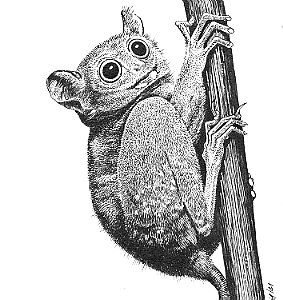 Tarsius
spectrum Tarsius
spectrum
Once represented by different forms in Europe and North America, the tarsiers are found today only in southeastern Asia, usually in the coastal forests and near creeks and rivers. Adapting to a changing environment, they have, in recent years, been observed in corn fields, hemp plantations and even gardens. In trees they propel themselves from branch to branch with powerful thrusts of their hind legs, using the soft, disc-like pads on their fingers and toes to grip the branches. On the ground they proceed in frog-like hops, or occasionally walk on all fours. The body length of these popeyed little animals is about 15 to 18 Tarsiers feed on insects and lizards and also small fish and crabs. When seizing its prey, the Tarsier closes its eyes tightly to prevent injury from the victimís struggles. |